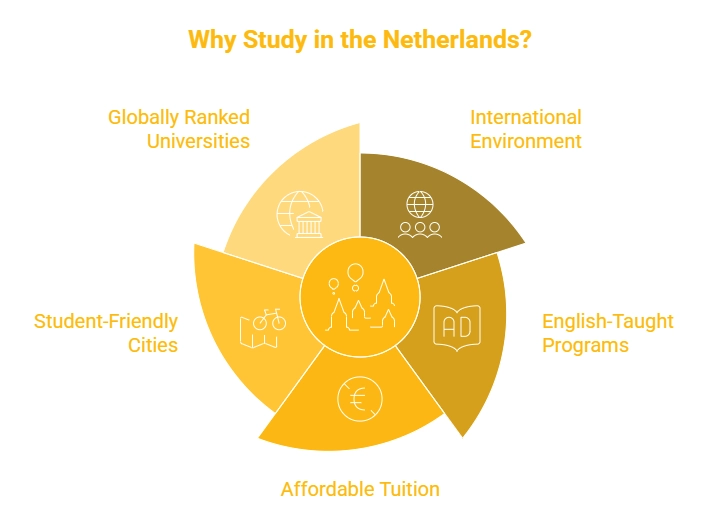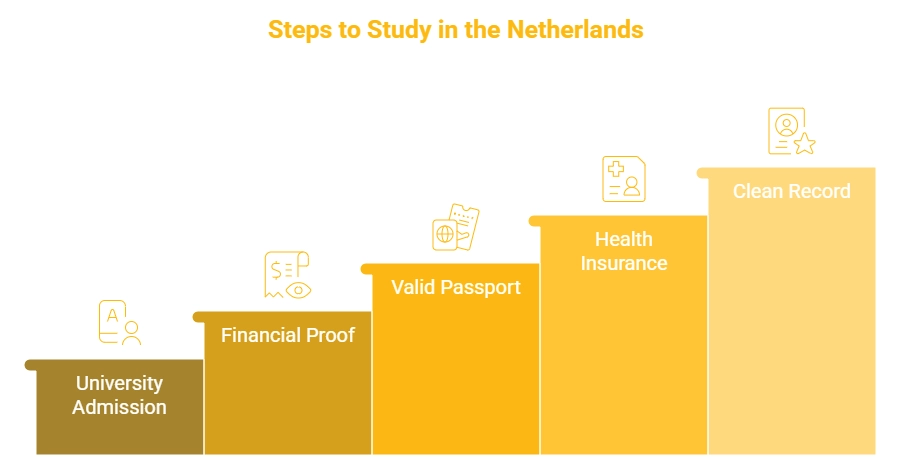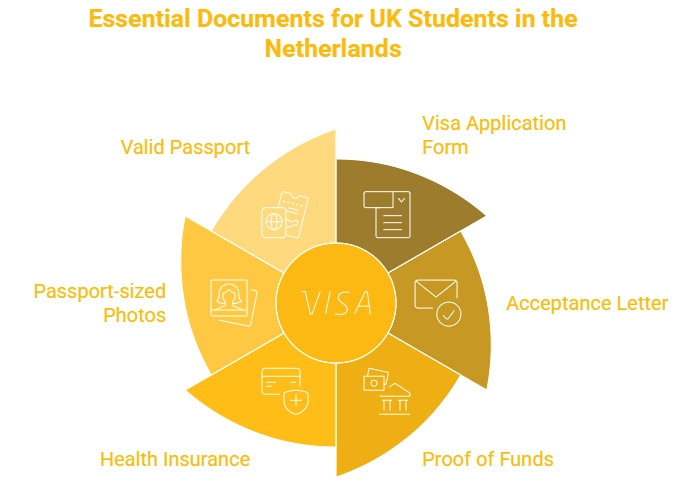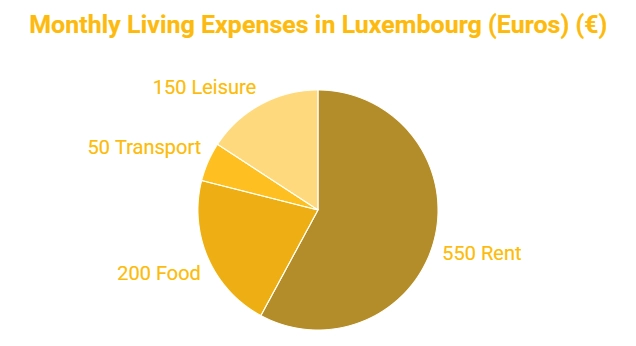Study in Netherlands
Don't know what to do?
Get Free Counseling
Why Study in Netherlands?
For students in the UK, the Netherlands provides a distinctive mix of strong academics, cultural variety, and useful job training. Here’s why you may want to think about studying there:
- International Environment: International students make up over 16% of the student body.
- English-Taught Programs: Over 2,000 courses are taught in English.
- Affordable Tuition: Tuition for EU students is about €2,530 per year.
- Student-Friendly Cities: Think Amsterdam, Utrecht, Groningen, and others.
- Globally Ranked Universities: Twelve Dutch universities rank in the top 200 globally.

Dutch education focuses on teamwork, critical thinking, and practical use, which is great for students seeking something beyond just lectures and tests.
Top Reasons to Study in Netherlands
1. Top Universities
- Delft University of Technology, the University of Amsterdam, and Utrecht University often appear in the top 100 global rankings.
2. Lower Living Expenses
- The cost of living is less compared to the UK. Students usually spend about €800–€1,100 each month on rent, food, transport, and recreation.
3. Located in Central Europe
- Amsterdam offers quick trips to Paris, Brussels, or Berlin, ideal for weekend getaways.
4. Job Opportunities
- Many degrees include internships. After graduation, work visas let students stay and work for up to a year.
5. Open Culture
- The Dutch are open, tolerant, and communicate directly, so international students can easily fit in.
Eligibility for Netherlands Student Visa
Students from the UK now need a student visa to study in the Netherlands, as they are regarded as non-EU students.
To be eligible, they need to:
- Get an admission from a Dutch university that is recognized.
- Show the proof of sufficient funds (about €12,000 a year).
- Have a passport that is valid.
- Have health insurance.
- Not have a criminal record.

Usually, the university handles the visa application once the student is admitted, making the process simple.
Netherlands Student Visa Requirements
UK students applying for a student visa (MVV + residence permit) should have these items ready:
- Filled-out visa application form
- Acceptance letter from a Dutch school
- Proof of funds (bank statements, scholarship info)
- Health insurance valid in the Netherlands
- Passport-sized photos
- A passport that's good for at least 6 more months

The visa usually takes 4–6 weeks to process. Most universities help students with their applications.
Cost of Studying in Netherlands
Studying in the Netherlands is cost-effective compared to many other Western countries.
|
Program Type |
EU Students (incl. UK) |
Non-EU Students |
|
Bachelor’s |
€2,530/year |
€6,000–€15,000/year |
|
Master’s |
€2,530–€4,500/year |
€13,000–€20,000/year |
Living Costs:
Rent: €400–€700/month
Food: €150–€250/month
Transport: €35–€70/month
Leisure: €100–€200/month

Many students get part-time jobs or seek scholarships to handle these expenses.
Top Universities in Netherlands
Here are some of the most popular and highly ranked institutions:
|
University |
QS Ranking 2025 |
Popular Programs |
|
Delft University of Technology |
#56 |
Engineering, Architecture |
|
University of Amsterdam |
#58 |
Business, Law, Social Sciences |
|
Utrecht University |
#66 |
Humanities, Sciences |
|
Wageningen University |
#80 |
Environmental Science, Biology |
|
Leiden University |
#73 |
Law, History, Medicine |
|
University of Groningen |
#80 |
Psychology, Economics |
Each university offers wide range of programs taught in English and offer solid support for international students.
Scholarships in Netherlands for International Students
For UK students, Dutch universities and governmental organizations provide a number of financial aid options:
- Holland Scholarship: A €5,000 award for students in their first year.
- Orange Tulip Scholarship: Awards that are specific to students coming from the UK.
- Erasmus+ and Turing Scheme: Financial support for both exchange programs and brief study periods.
- University-Specific Grants: Choices based on financial need and academic achievement.
Since scholarships are highly competitive, applying early with solid grades is important.
Steps to apply for Netherlands Student Visa
Step 1: Begin by exploring English-language programs at universities in the Netherlands. Resources such as Study in NL and individual university sites offer details on courses, admissions criteria, and deadlines.
- Common fields of study for UK students are:
- Business and Economics
- Engineering and Technology
- Social Sciences
- Law and International Relations
- Environmental and Life Sciences
Confirm that your chosen program has official accreditation and qualifies you for a student visa.
Step 2: Studielink serves as the primary application system for Dutch higher education. The steps often include:
- Creating a Studielink account.
- Choose your school and program.
- Submitting required documents like transcripts, a personal statement, and English test results.
- Paying application costs, that often runs between €100 and €150.
Application dates differ by school and program. Most bachelor's programs close around May 1, while master's programs range from March 1 to June 1.
Step 3: If your application is successful, the university sends an official acceptance letter. This document is key for visa applications and verifies one’s ability to attending school in the Netherlands.
Some schools might also do interviews or ask for extra papers before they accept you.
Step 4: In the Netherlands, universities often help international students get their visas. After you accept an offer, the university will apply for your visa with the Immigration and Naturalisation Service (IND).
You will be applying for:
- MVV (Machtiging tot Voorlopig Verblijf): An entry visa for stays longer than 90 days.
- Residence Permit: This lets you live and study in the Netherlands for the length of your program.
Step 5: To support your visa application, make sure you have these documents:
- A passport that is valid for at least six more months.
- Passport-size photos that meet Dutch standards.
- An acceptance letter from your university.
- Proof that you have enough money to live on (about €12,000 a year).
- Bank statements.
- Scholarship letters, if you have them.
- If a parent or someone else is helping you financially, include a financial guarantee from them.
- Proof that you have health insurance that works in the Netherlands.
- A completed visa application form. Your university will give you this form.
Some universities might also ask for a signed statement that says you plan to finish your studies there.
Step 6: Visa processing usually takes 4–6 weeks. If your paperwork is correct and complete, it might be quicker. The IND will let your university know when your visa gets approved. After approval, you’ll get instructions on picking up your MVV from the Netherlands Embassy in London or a specific consulate.
Step 7: Upon arrival in the Netherlands, it is important to:
- Register with the local municipality (Gemeente) within five days.
- Collect your residence permit card.
- Open a Dutch bank account.
- Complete your health insurance and student registration.
Your university will give guidance on these steps during orientation week.
Step 8: If your program extends beyond a year, you must renew your residence permit each year. This requires you to:
- Maintaining Academic Progress.
- Provide updated financial proof.
- Pay the renewal fees (about €210).
Not meeting academic standards can lead to your visa being cancelled, so it's important to stay involved and up-to-date during your studies.
In the Netherlands, graduates from UK universities have the option to apply for an Orientation Year Visa (Zoekjaar). It lets them stay in the country for up to a year to look for a job.
Post-Study Work Visa in Netherlands
In the Netherlands, graduates from UK universities have the option to apply for an Orientation Year Visa (Zoekjaar). It lets them stay in the country for up to a year to look for a job.
Key Benefits:
- No need for employer sponsorship.
- Access to jobs and internships in the Netherlands.
- Chance to switch to a longer-term residency permit.
Dutch university graduates are well-regarded in Europe, especially in tech, finance, and healthcare fields.
Why Choose Y-Axis?
- Professional Advice for UK Applicants: Tailored assistance for UK students submitting applications to universities in Europe.
- End-to-End Application Support: Everything under one roof, from choosing a university to applying for a visa.
- Scholarship Help: We assist you in locating and submitting applications for the top scholarships for which you qualify.
- Preparation and Review of Documents: Proper documentation is necessary to prevent application delays or rejections.
- Trusted by Thousands: More than 1 million customers have used Y-Axis to successfully complete their international education.
